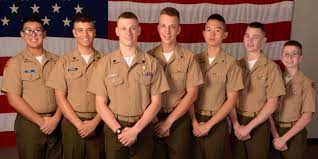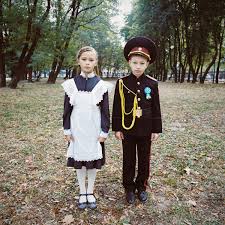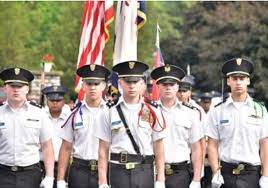Military Training Academy: Preparing the Next Generation of Leaders
Military training academies are institutions that provide education and training for individuals who aspire to become officers in the armed forces. These academies are known for their rigorous curriculum and the high standards they uphold, both physically and academically. The purpose of these institutions is to prepare the next generation of leaders who will serve their country with honor, integrity, and bravery.
The training provided by military academies is not for everyone. It requires a level of discipline, dedication, and commitment that few possess. The physical demands alone can be daunting, as cadets are required to maintain a high level of fitness through rigorous physical training programs. Mental toughness is also necessary, as cadets must learn to cope with stress and pressure while maintaining focus on their goals.
The academic curriculum at military academies is also challenging. Cadets are required to study a range of subjects that include history, political science, mathematics, and engineering. They must also develop critical thinking skills that enable them to analyze complex situations and make sound decisions under pressure.
But perhaps the most important aspect of military academy training is leadership development. Cadets are taught how to lead by example, inspire others, and make tough decisions when necessary. They learn how to work as part of a team while also taking responsibility for their own actions.
Graduates of military academies go on to serve in various roles within the armed forces. Some become officers in combat units or special forces teams. Others serve in support roles such as logistics or intelligence gathering. Regardless of their role, all graduates share a common bond: they have been trained to serve their country with honor and distinction.
Military academy graduates also tend to excel in civilian careers outside of the military. Their leadership skills, discipline, and work ethic make them highly sought after by employers in fields such as business, engineering, law enforcement, and politics.
In conclusion, military training academies play a vital role in preparing the next generation of leaders who will serve their country with honor and distinction. The rigorous training and education provided by these institutions instill a sense of discipline, dedication, and commitment that serves graduates well throughout their lives. If you are considering a career in the military or seeking to develop your leadership skills, a military academy may be the perfect place to start.
Frequently Asked Questions About Military Training Academies
- What type of military training is offered at the academy?
- How long does the military training program last?
- What qualifications are required to join a military training academy?
- Are there any special benefits for attending a military training academy?
- What types of activities are part of the military training curriculum?
- Is housing provided during my time at the academy?
- Are there any costs associated with attending a military training academy?
- How can I get more information about joining a military training academy?
What type of military training is offered at the academy?
Military academies offer a wide range of training programs that are designed to prepare individuals for leadership roles in the armed forces. The specific type of military training offered at an academy may vary depending on the institution, but here are some examples of the types of training that are typically provided:
- Physical Training: Military academies place a strong emphasis on physical fitness and endurance. Cadets participate in rigorous physical training programs that include running, weightlifting, and other exercises designed to build strength and endurance.
- Leadership Development: Leadership development is a key component of military academy training. Cadets learn how to lead by example, inspire others, and make tough decisions when necessary.
- Tactical Training: Cadets receive tactical training in areas such as marksmanship, close-quarters combat, and urban warfare. This type of training is designed to prepare cadets for combat situations they may encounter in the field.
- Military Science: Military science courses cover topics such as military history, strategy and tactics, and national security policy. These courses provide cadets with a solid understanding of the principles that guide military operations.
- Survival Training: In addition to combat training, military academies also provide survival training to cadets. This includes learning how to survive in harsh environments such as deserts or mountains.
- Technology Training: As technology continues to play an increasingly important role in modern warfare, military academies also provide technology training to cadets. This includes learning how to operate advanced weapons systems and other high-tech equipment.
Overall, military academies offer a comprehensive range of training programs that are designed to prepare individuals for leadership roles in the armed forces. The specific type of training offered may vary depending on the institution, but all programs share a common focus on discipline, dedication, and commitment to service.
How long does the military training program last?
The length of military training programs varies depending on the branch of service and the specific job or role a person is training for. Basic military training, also known as boot camp, usually lasts from 8 to 13 weeks, but can be longer for certain branches or specialties.
After basic training, service members attend advanced individual training (AIT), which can last anywhere from a few weeks to several months. The length of AIT depends on the job or specialty being pursued. For example, AIT for a combat medic in the Army can last up to 16 weeks, while AIT for an Air Force security forces specialist can last up to 65 days.
In addition to initial training programs, military personnel are required to undergo ongoing training throughout their careers. This may include additional specialized training related to their job or service branch, as well as periodic physical fitness tests and weapons qualifications.
Overall, the length of military training programs varies depending on many factors. However, all military personnel are required to complete basic and advanced training before beginning their service in order to ensure they have the necessary skills and knowledge to serve effectively and safely.
What qualifications are required to join a military training academy?
The qualifications required to join a military training academy can vary depending on the specific academy and the country in which it is located. However, there are some general requirements that are common across many military academies.
Firstly, applicants must typically be citizens of the country in which the academy is located. They must also meet certain age requirements, which can vary depending on the academy. In most cases, applicants must be between 17 and 23 years of age at the time of enrollment.
Physical fitness is also an important consideration for admission to a military training academy. Applicants must typically pass a physical fitness test that assesses their strength, endurance, and overall fitness level. They may also be required to meet certain height and weight requirements.
Academic qualifications are also important for admission to a military academy. Applicants must typically have completed high school or an equivalent program and have achieved good grades in subjects such as math, science, and English. Some academies may require applicants to take standardized tests such as the SAT or ACT.
Applicants may also be required to demonstrate leadership potential through participation in extracurricular activities such as sports teams or community service organizations. They may be asked to provide letters of recommendation from teachers, coaches, or other adults who can attest to their character and leadership potential.
In addition to these general requirements, each military training academy may have its own specific requirements for admission. Prospective applicants should consult with the specific academy they are interested in attending for more information on their admission criteria and application process.
Are there any special benefits for attending a military training academy?
Yes, attending a military training academy provides several special benefits. Here are some of the most significant benefits:
- Education: Military academies provide a high-quality education that is on par with some of the best universities in the country. The curriculum includes a broad range of subjects, including science, math, history, and foreign languages.
- Leadership: Military academies are renowned for their leadership training programs. Cadets learn how to lead by example, inspire others, and make tough decisions under pressure. These skills are highly valued in all aspects of life.
- Career Opportunities: Graduates of military academies have access to a wide range of career opportunities both within and outside the military. They can pursue careers as officers in combat units or special forces teams or work in support roles such as logistics or intelligence gathering.
- Networking: Attending a military academy provides cadets with an extensive network of alumni who can help them throughout their careers. This network can be invaluable when seeking employment or advancing in their chosen field.
- Financial Benefits: Military academies provide free tuition, room and board, and medical care to their cadets. Additionally, upon graduation, cadets receive a commission as a second lieutenant in the armed forces and may be eligible for various financial incentives.
- Prestige: Graduating from a military academy is considered an impressive achievement that carries significant prestige within the military and civilian communities alike.
In summary, attending a military training academy provides numerous benefits that can help graduates succeed both within and outside the military. From high-quality education to leadership training to financial incentives, these institutions offer unique opportunities for those who are willing to commit themselves to serving their country with honor and distinction.
What types of activities are part of the military training curriculum?
The military training curriculum is designed to provide a comprehensive education and training program for individuals who aspire to become officers in the armed forces. The curriculum covers a wide range of topics and activities, including:
- Physical Training: Cadets are required to maintain a high level of physical fitness through rigorous physical training programs, which include running, swimming, weightlifting, and other exercises.
- Military Tactics: Cadets are taught various military tactics such as marksmanship, hand-to-hand combat, and small unit tactics.
- Leadership Development: Cadets learn how to lead by example, inspire others, and make tough decisions when necessary. They learn how to work as part of a team while also taking responsibility for their own actions.
- Drill and Ceremony: Cadets learn the proper way to march in formation and perform various military ceremonies.
- Academic Curriculum: Cadets study a range of subjects that include history, political science, mathematics, engineering, foreign languages, and leadership theory.
- Field Training Exercises: Cadets participate in field training exercises that simulate real-world scenarios such as combat operations or disaster relief missions.
- Ethics Training: Cadets receive instruction on ethical decision making and are taught the importance of adhering to the military’s code of conduct.
- Military History: Cadets study the history of warfare and the role that military forces have played in shaping world events.
Overall, the military training curriculum is designed to prepare cadets for the challenges they will face as officers in the armed forces. It provides them with a well-rounded education that includes physical fitness, tactical proficiency, leadership development, academic knowledge, ethics training, field experience and an understanding of military history.
Is housing provided during my time at the academy?
No, housing is not provided during your time at the academy.
Are there any costs associated with attending a military training academy?
Yes, there are costs associated with attending a military training academy. However, these costs are typically lower than attending a traditional college or university.
For example, at the United States Military Academy (West Point), tuition, room and board, and other expenses are fully funded by the government. In addition, cadets receive a monthly stipend to cover personal expenses such as clothing and books.
At the United States Naval Academy (Annapolis), tuition is also fully funded by the government. However, midshipmen are required to pay for their own room and board. They also receive a monthly stipend to cover personal expenses.
The United States Air Force Academy (Colorado Springs) operates similarly to West Point and Annapolis in terms of funding. Tuition, room and board, and other expenses are fully funded by the government. Cadets also receive a monthly stipend.
Military training academies in other countries may have different funding models. Some may require cadets or their families to pay tuition or other fees.
It’s worth noting that attending a military training academy comes with certain obligations. Graduates of these institutions typically serve in the armed forces for a set period of time after graduation (usually five years). This service commitment is part of the agreement between cadets and their respective governments when they enter the academy.
Overall, while there are costs associated with attending a military training academy, they are generally lower than attending a traditional college or university. In addition, graduates of these institutions have access to unique career opportunities that can be highly rewarding both personally and professionally.
How can I get more information about joining a military training academy?
If you are interested in joining a military training academy, there are several steps you can take to gather more information and learn about the application process. Here are some suggestions:
- Research different military academies: There are several military academies in different countries, each with their own requirements and application processes. Start by researching the different academies to determine which one might be the best fit for you.
- Check eligibility requirements: Each academy has its own eligibility requirements, such as age limits, citizenship requirements, and educational qualifications. Check these requirements carefully to determine if you meet them.
- Contact the academy: Once you have identified an academy that interests you, contact their admissions office or visit their website for more information about the application process.
- Attend an information session: Many military academies hold information sessions for prospective applicants. Attending one of these sessions can provide valuable insight into what it takes to be accepted into the academy and what life is like as a cadet.
- Speak with current or former cadets: If possible, try to speak with current or former cadets of the academy you are interested in. They can provide firsthand knowledge about what it takes to succeed at the academy and what life is like after graduation.
- Prepare your application: The application process for military academies is typically rigorous and competitive. Be sure to carefully follow all instructions and submit a complete application that highlights your strengths and qualifications.
Remember that applying to a military training academy is a significant commitment that requires dedication, hard work, and sacrifice. However, for those who are up for the challenge, it can provide an unparalleled education and preparation for a career in service to their country.




